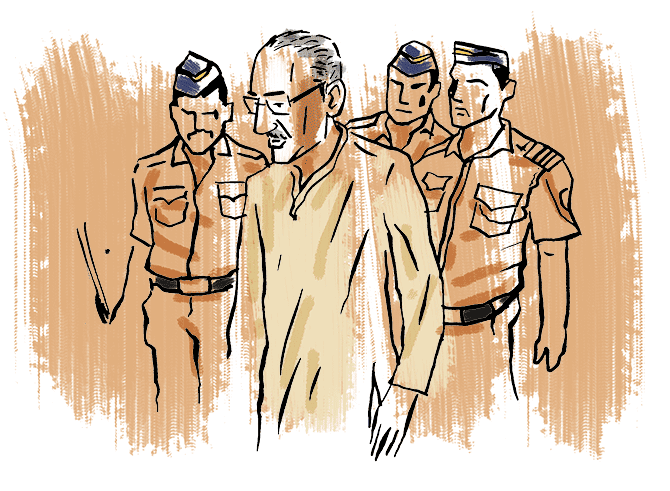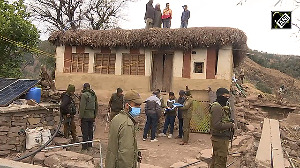Seeing Indrani in court with her perpetually sunny demeanour and beaming face is sometimes as unreal an experience as making sense of court delays.
Vaihayasi Pande Daniel reports from the Sheena Bora murder trial.
Illustration: Dominic Xavier/Rediff.com

Manohar More, a senior Mumbai advocate in his 50s and a member of the Bar Association of the Bombay City Civil and Sessions Court, collapsed around noon in the bar room of the court October 24, his colleagues said. He was rushed to the nearby Bombay Hospital, where he died of a massive heart attack.
His sudden death led Tuesday, October 24, to another adjournment of the Sheena Bora murder case, till October 30, since More was an associate of Sudeep Pasbola, Accused No 1 Indrani Mukerjea's counsel.
It has been a dull stop-and-start month for this trial. Adjournments, postponements, delays and holidays have dogged the progress of the case.
Navratri, Dusshera, Karva Chauth and Diwali have come and gone, with pomp and circumstance, with Courtroom 51 seeing just brief hopeful spurts of activity, like a damp firecracker that attempts to light up but keeps fizzling out with a poof.
Tuesday found the south Mumbai Kala Ghoda sessions court lethargically recovering from the Diwali break that ended Monday.
The tempo at the normally bustling, teeming court had not yet picked up again, with many lawyers and perhaps court personnel absent. At lunchtime the legal clerks were still exchanging festival sweets and farsan (salties).
Even the barricades surrounding and protecting this court's annexe building outside had not come back onto David Sassoon Library Marg.
Nor had the drawing pins on the green case notice boards. The list of the day's cases in CBI Special Judge Jayendra Chandrasen Jagdale's court hung from a string tied to the top frame of an adjoining door.
Having now spent eight months at this sessions court, probably like the trio of accused, who have been coming here month after month since 2016, my eyes and ears quickly pick out the tiny changes or the tedious lack of change in the court landscape -- the young Muslim woman police officer whose attractive face you no longer see because she has received a promotion to the commissioner's office; the broken handle of a lawyer's case file that sits day after day, undiscarded, on a dusty trunk in Courtroom 51; the stained, rickety mud-coloured chairs in the courtroom that dumpily slope downwards making it difficult to sit without sliding off; the entryway X-ray machine that has now been working without a hiccup -- bravo -- for a month; or the new girlish French pleat hairstyle Indrani is sporting.
Equally familiar are the habits of the various sessions court persona. You know that the senior policewoman, who grumblingly accompanies Indrani to many a hearing, will fall asleep on the bench outside while proceedings are on.
That Peter Mukerjea, civic-minded even in jail, will hunt for a trash can when he has to discard even a tiny wrapper.
That the black court dog will always be lying stretched out on the first landing snoozing, unaware of the importance of the building he represents.
That the usually genial Judge Jagdale will only in the rarest of rare moments lose his temper, although at times he can be slightly forbidding.
As you get more familiar with the halting rhythms of a lower court, you now understand better, even if you don't forgive, the interminable delays.
As a colleague intelligently pointed out, there are so many players that have to be present for a single court hearing to take place successfully -- the judge, his clerks, the stenographer, the prosecution lawyers, the CBI investigating officer (since it is a CBI court), the defence lawyers, the accused, the guards of the accused, prison bus drivers, and so on, apart from a favourable environment (no rain, no traffic, no strikes, no holidays, no missing DVD players/trial exhibits/documents etc).
No one is a stickler for time around here, with time comfortably stretchable and court hearings often starting off 40 or 50 minutes late.
How can they be, when it takes so many factors to pull off a successful date in court?
When the delay of a hearing in one courtroom or court can affect the schedule of another if the lawyer happens to be common.
Everyone's Zen-like patience, even the judge's, is much more comprehensible, many months later.
The standstill in Courtroom 51 this past month has also been courtesy a clutch of cell phone companies who at times have behaved more officious than even the government.
After a tiresome back and forth and finally a heated, three-cornered debate between Judge Jagdale, the defence lawyers and the cell phone nodal officers, since September, over whether the call data records of Accused No 2 Sanjeev Khanna, Accused No 3 Shyamvar Rai, victim Sheena Bora and her partner Rahul Mukerjea from periods between 2012 and 2015 were available, finally, under the judge's stern duress, the companies are making an effort to recover them.
Quite why these companies are so reluctant to concede that they have them -- and in effect risk obstructing justice -- is a mite baffling from this corner of the court, from where one observes the proceedings.
Perhaps it is about cost. Maybe it is the unwillingness to set a precedent (not that it hasn't been set already, with call records an essential new tool to any crime investigation or criminal case).
Or else there is some rather odd and mysterious reason.
In previous proceedings Pasbola alluded to a different motive when he said, "It is seldom that they are impartial. Nodal officers are (often former) law enforcement officers and are totally under the thumb of law enforcement officers. They try to create hurdles."
That the cell companies must have records going back many years is a no brainer -- for security reasons, for commercial reasons, for legal reasons.
Tuesday finally the first records, requested for by the defence, were tabled -- voila! -- by the nodal officer for Vodafone in Mumbai. They were the CDRs of Khanna and Rai -- the Mukerjeas' former driver turned approver -- from the period March to June 2012.
Missing yet are records of Sheena, Rahul and from another few phone numbers of Rai's, including the SIM he had at the time of his arrest apparently.
Khanna (in the illustration) had been requesting the data Vodafone just delivered for many months and badgering the CBI too in conversations that took place outside the courtroom.
Khanna's contention was that on April 24, 2012, the day Sheena was allegedly strangled to death, he could not have been in Bandra, north west Mumbai, getting into the Chevrolet driven by the then dutiful Rai with Indrani and Sheena in it, because he was checking into his Pochkhanawala Road hotel in Worli, central Mumbai, after 6 pm, having arrived in Mumbai at 5 pm on a visit to see his daughter Vidhie from his earlier marriage with Indrani.
The call data records could prove that, hence their vital importance to him.
Copies of Rai and Khanna's records, which the Vodafone nodal officer produced on Tuesday, were handed over to the CBI and to the court. Photocopies of it, over the next couple of days, will be passed along to the lawyers, the relatives of the accused and to the accused.
Khanna's cousin who arrived late for Tuesday's brief hearing was also looking into obtaining 'soft' copies of these records too.
While Vodafone has delivered, the court waits on Airtel. The nodal officer, Bharti Airtel, Mumbai, was back on the stand on Tuesday requesting more time to track the cell data records.
He stated that it took all of four months to track the earlier data records in this case -- he was probably referring to records for Indrani's and another of Rai's phones that the CBI already had in its possession since the start of the trial.
The Airtel nodal officer said he needed four weeks to supply the data of the other ones. "IT professionals are doing it. We have outsourced the job. We would need a similar amount of time."
"I am not aware of the technicalities," Judge Jagdale said uncompromisingly, implying he didn't want to know them and asked Airtel to deliver the records in 15 days.
Interestingly, Vodafone's nodal officer, by contrast, said it took the company 20 days to fish out the 2012 records of Khanna and Rai.
Call records from Reliance and MTNL are also awaited for perhaps more SIMSs that once belonged to Rai.
As it was established earlier in bizarre bouts of cross examination that took place mid-August, Rai had numerous phone numbers, so many that he himself was unable to remember how many he ever had or how he obtained them.
The driver had said every time a new or more attractive cellphone scheme released he applied for it, not always in his name.
A rewind: It was Pasbola who established to the court, a few weeks ago, rather forcefully the absolute need to have all call record data handy, especially of Rai, so he could take the cross examination ahead more quickly to its rightful conclusion.
"If they are giving the CDRs I can proceed... I don't want so many breaks. My continuity gets disturbed," the lawyer stated.
With that Pasbola inflexibly requested a halt in the cross examination and adjournment in the case on October 11, till the records were swiftly produced.
While CBI Counsel Bharat Badami was not happy with Pasbola's October 11 request for the adjournment, as they awaited the CDRs, declaring stormily, "I am worried about the safety and security of my witness... what kind of cross-examination is this!" Judge Jagdale acceded to Pasbola's wishes.
Although Pasbola was not in the courtroom on Tuesday, his assistant Rounak Naik, on his behalf, agreed to have the "cross" resume on October 30, utilising the new Vodafone data just unearthed.
So Monday next Rai will be back on the stand.
Peter had several post-Diwali visitors on Tuesday awaiting him when he arrived from the Arthur Road jail at 2.30 pm, about 15 minutes before the start of the hearing.
His sister Shangon Das Gupta, who had not seen him since before Dusshera, was there with his lunch, as were, it seemed, a bunch of six former Star TV staffers and their spouses, including Sameer Nair, who worked with Peter at the television company.
This group, who, with their tottering wedges, distinctive attire and heavy perfume, belonged to a country quite different from that of these melancholy corridors, eagerly waited for Peter.
I ruminated what Nair -- who revived Star Plus's fortunes in the early 2000s with shows like Kaun Banega Crorepati and Kyon Ki Saas Bhi Kabhi Bahu Thi -- would make of his maybe first trip to the sessions court.
Would Nair, -- now head of Kumaramangalam Birla's Applause Entertainment -- who is evidently fond of the expression 'Great stories happen to those who tell them', some day, call upon Peter for some storytelling?
Peter, who now shares barrack space with individuals like politician Ramesh Kadam and former deputy chief minister Chhagan Bhujbal in the jail, genially hugged each one of them and declared bravely that he was "hanging in there."
Indrani, still festive looking on Tuesday in a vermillion and white kurta-salwar, who was ignored by Peter's visitors and in turn said she didn't know who they were, had just come through a busy festival season at the Byculla jail.
After fasting for nine days for Navratri, eating only fruit and going barefoot, she broke her fast for Ma Durga, she said earlier, with ceremonial washing of the feet of nine little children of fellow prisoners.
There were provisions for inmates to keep their murtis of gods and goddesses in jail, Indrani explained then. Further, the women prisoners even played dandiya one day.
As she chattered, upbeat, one wondered if she was speaking about the prison that had recently received further notoriety, after the filing of the chargesheet for the murder of inmate Manjula Shetye at Byculla jail. Or some other.
Indeed, seeing Indrani in court with her perpetually sunny demeanour and beaming face is sometimes as unreal an experience as making sense of court delays.
Next Monday, October 30, when the cross-examination of the main witness Rai in the Sheena Bora case resumes, there are chances that details that emerge from the newly acquired call data records may begin to alter the path of the trial.











 © 2025
© 2025